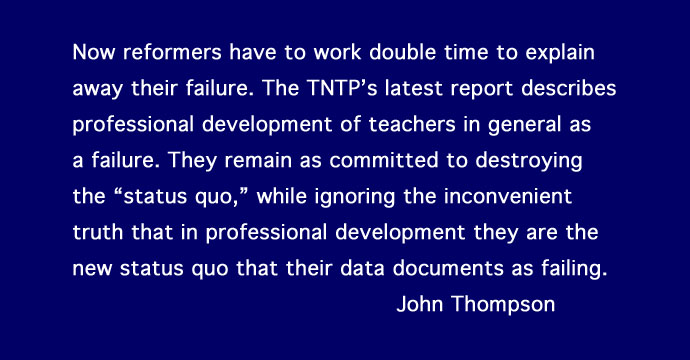By John Thompson.
The Education Post’s Peter Cunningham sent out a
mass email saying,
Meanwhile,
Chalkbeat Tennessee explores the ‘healthy tension between accountability and instructional freedom’ triggered by Duncan’s signature reform program, Race to the Top, and asks if the policies will continue now that federal pressure and funding has gone away.
Such spin is to be expected, but it would be newsworthy if the reliable Chalkbeat actually reached that conclusion. In my experience, there’s always tension between accountability metrics and the professional autonomy of teachers. Rarely is the tension healthy, however. So, I was legitimately curious when I followed Cunningham’s link.
The real statement Cunningham quoted was uttered by a director of the State Board of Education, and her words were so ridiculous that even Cunningham didn’t quote them verbatim. She actually said, “There’s always a healthy tension between accountability and … instructional freedom,” (emphasis added)
So, did Chalkbeat explore the allegedly healthy tension that always happens? What was it’s conclusion on that give and take? The article’s subtitle was: “Educators say emphasis on test scores prevents them from improving their teaching.”
Early in the report, Chalkbeat recalls a Nashville lesson that the teacher’s immigrant students loved. The kids “observed birds in order practice scientific language in English.” But, after the teacher received the second-lowest score on the state’s teacher evaluation system, the project was scrapped. Chalkbeat quoted the teacher’s exasperated response to the RttT’s mixed messages, “We’re told, ‘Don’t teach to the test! We want our classes to be vibrant places! … But the reality is, your evaluation is based on those test scores. That’s a double message.” (By the way, the value-added models required by the RttT are especially biased against teachers with English Language Learners.)
Also at the beginning of the article, a teacher praised a lesson she learned from the RttT about asking better questions. By the end of the story, however, the teacher has to adjust to the new TNReady Common Core-aligned tests and that takes time away from “the type of instruction officials and teachers agree is best.” The teacher concludes, “’We just can’t teach things as deeply as we used to.’”
In the article’s conclusion, another frustrated educator says, “It’s debilitating, because no matter how much you teach, no matter how much you incorporate differentiated learning, RTI — it’s still one test. One day. …And that’s almost antithetical to the educational push they have right now.” She then added, “If the basic premise is that one or two tests show a student’s progress, we will never get better.”
I can’t say that I’m surprised that the RttT largely failed in Tennessee and across the nation. I still recall my dismay when I went on a weird binge – reading state RttT applications. Before that disheartening experience, I was thankful for the President who I loved and his $100 billion bailout of schools during the Great Recession. [note: an earlier version of this post incorrectly described this as a $100 million bailout.] Reading the grant applications, and the subsequent School Improvement Grant applications, I realized that the RttT money was likely to be wasted – at best. Being such an Obama loyalist, however, I hoped that if nothing else the administration would really conduct these education experiments in an intellectually honest manner. If the RttT (and SIG) gambles worked, that would be great. If they failed, a few billion dollars would not be too much of a price to pay for learning lessons about scaling up school improvement.
The Tennessee RttT process gave its districts a choice: They could either participate in all of the reform agenda as “participating” districts, as defined in the application, or they could decline to participate entirely. There was no middle ground. The state made it explicit; it would use value-added evaluations to fire up to 30% of the state’s teachers. Tennessee asserted “Teacher effect data and the new annual teacher and principal evaluation data will drive all professional development.” (emphasis in original) Such dogmatism wasn’t surprising since The New Teacher Project and Teach for America would receive $30.6 million for Human Capital in the Achievement School District.
Now reformers have to work double time to explain away their failure. The TNTP’s latest report describes professional development of teachers in general as a failure. They remain as committed to destroying the “status quo,” while ignoring the inconvenient truth that in professional development they are the new status quo that their data documents as failing.
Moreover, the ASD is failed so badly that Memphis is placing a moratorium on it. Memphis made that decision after a Vanderbilt study showed that Memphis’s iZone schools “have sizeable positive effects on student test scores, while the ASD’s effects are marginal.”
So, it’s “déjà vu all over again.” As Duncan exits the Obama administration, his former press secretary who is now funded by the Broad Foundation, has doubled down of the spin. Have they no shame?
What do you think? Is Peter Cunningham just engaging in harmless spin? Or, does this type of misrepresentation of the facts by the Education Post and the TNTP indicate that corporate reform still dangerous?
Related






Leave a Reply